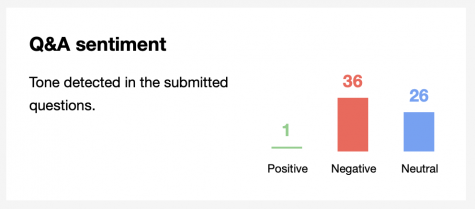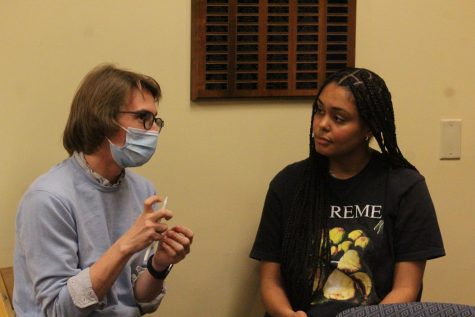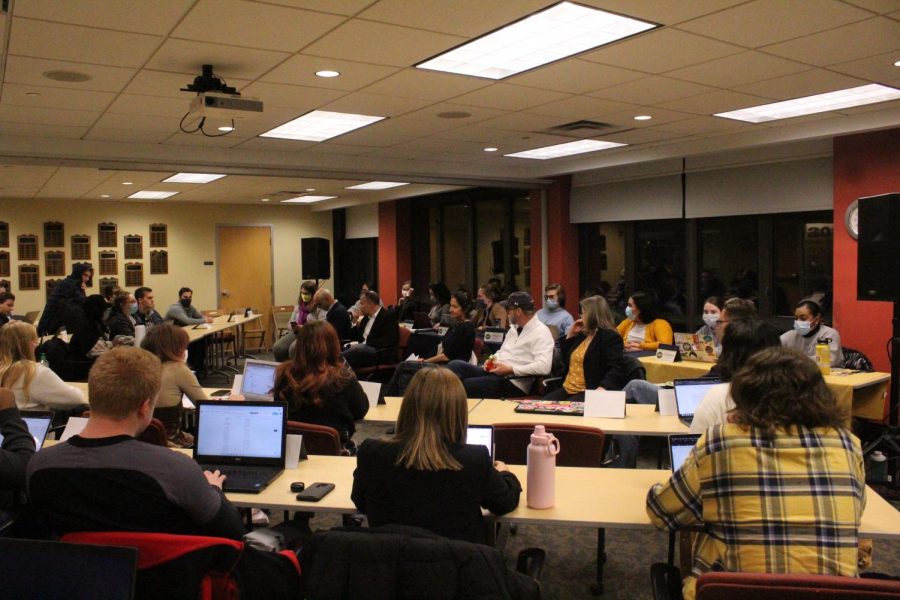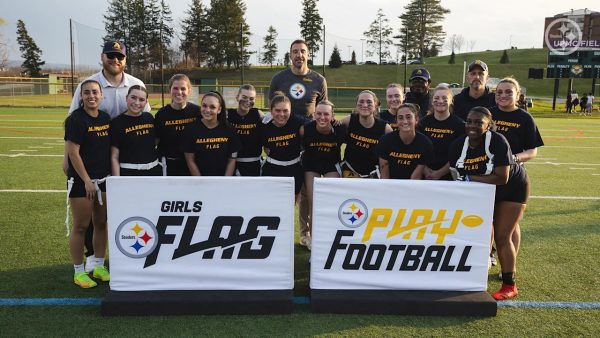Link, cabinet face tough questions at General Assembly
Members of Hilary Link’s cabinet sit in between the ASG Cabinet’s dais and the ASG Senate prior to the Nov. 16 General Assembly
Students packed room 301/302 of the Henderson Campus Center Tuesday night to hear President Hilary Link and six of her cabinet members field questions from the student body in a tense session of the Allegheny Student Government General Assembly.
The Q&A session, which included submissions from before the session and a live Slido chat as the night progressed, touched on a number of issues across campus. ASG declined to release a transcript of the live session because “many of the questions contained discriminatory, insensitive, and harassing information.”
However, in an email to The Campus, Harris did provide a “sentiment analysis” the platform produced of the event. That analysis showed that almost 60% of the 63 questions asked were considered “negative” by the platform, while just one was considered “positive.” The remainder were classified as “neutral.” However, the platform did not differentiate between “negative” and “derogatory,” and questions about difficult topics may have been analyzed as “negative” without being harmful or toxic.

Several messages in the live chat referenced specific and personal ongoings of administrators and ASG officers. This included a question about Vice President for Institutional Advancement Matthew Stinson.
“Why has VP Stinson not been investigated for his discriminatory behavior towards LGBT and disabled employees?” ASG Parliamentarian Rachael Harris, ’23, read from the dais.
Link, who fielded most of the questions, laughed, adjusted her seat, and said, “I’m not going to comment on that. There’s nothing to investigate.”
At one point, Harris paused the session and called for an end to such questions.
“Moving forward, a lot of the questions in the Q&A have been disrespectful not only to members of the current ASG cabinet and senate, but also to members of (Link’s) cabinet,” Harris said. “I am going to advise that those questions that are being disrespectful stop being asked so that we can continue this conversation between students and Hilary Link’s cabinet.”
Dean for Student Success Ian Binnington also seemed visibly frustrated in response to a question that called Allegheny’s Disability Services, “abysmal.”
“I don’t accept the premise of the question,” Binnington said. “If a student has a specific concern with something that has happened with disability services, they should come to me, and I will do my best. But the reality is — and again, I know nothing about this particular student or this particular individual’s case, but I think part of what we’re dealing with here is we often get told that (administrators) don’t listen to (students), we don’t hear you. We do. We don’t always agree with you. Those two things are not the same. I can’t speak to an individual student’s experience (and) I don’t wish to invalidate their particular experience, I simply don’t know enough to answer that question.”
After Link and her cabinet had left, several constituents and senators spoke up about what they perceived to be a smug and dismissive attitude from both Binnington and Link. Jaelyn Valentin, ’25, said afterwards that while the conversation may have been tense, administrators should have been more respectful of students’ perspectives.
“Though a lot of the questions were hard and difficult for (Link) and her cabinet to hear, I do think that the responses could have been more empathetic,” Valentin said. “I do think that laughing in the face of students’s disadvantages — putting (students of color and LGBTQ) students at a disadvantage — that was very difficult to hear.”
The recently created Class Dean positions are designed to give students a firmer point of contact with the administration. Niki Fjeldal took the position of First-Year Class Dean in the summer of 2021, and the administration is currently examining candidates for the other classes. These deans are intended to engage with the class as the go-to “one-stop-shop” for both student and faculty questions, according to Binnington.
“That class dean then becomes the person that has the pulse on what’s going on with the class — what are their particular concerns, what’s going on in the residence halls,” Binnington said. “It’s not as though we haven’t known that information, but it’s been distributed among a whole variety of people.”
William Visnic, ’22, walked by the assembly but did not bother to attend. A self-identified supporter of the “Impeach Link” movement, he said that Link, who is now in her third academic year as college president, had been given enough chances by the student body.
“I don’t want to legitimize (the Assembly) by coming, because it should have happened months ago,” Visnic said. “I think we’re a little far down the road for her to put on this facade of wanting there to be a dialogue with students.”
Despite the tense atmosphere, the administration did respond to issues from across campus. The very first question poked at a theme that reappeared later on in the night: shared governance. Link reminded the assembly that ultimately, administrators would make the final call on most issues.
“Shared governance is all about discussing, talking, educating, but ultimately, the decision rests in the President and the Cabinet,” Link said. “Just because a certain group doesn’t get to make decisions doesn’t mean that the input that we get from students, faculty, and lots of groups across campus do not influence the decisions that we ultimately make.
Binnington echoed that sentiment, noting that students had been successful in the past in adjusting the administration’s policies.
“There are policies we have on the books right now that exist because students came to one of us and said, ‘that’s a good idea’ and we agreed,” Binnington said.
The administration also discussed the ongoing Academic Program Review, which Link noted is not an anomaly in the long-term life of the college.
“The academic program review is actually a fairly cyclical and regular process that happens at Allegheny and at colleges and universities all over the country,” Link said. “For example, back in 2017, before I arrived, there was an academic program review where changes were then made to the curriculum which resulted in the addition of a Business major, (Integrative) Informatics (major), Art, Science, and Innovation (major), (and) Energy and Society (minor).”
A follow-up question asked for the financial justification for the review, which some students have criticised as being invented as an excuse to cut staffing and hire more administrators in the form of class deans.
“The data is real,” Link said. “The data shows that we have a $10 million deficit. We are taking the steps necessary to both balance our budget and also reduce what has become an overdependence on the endowment, which is not a good financial practice for institutions of higher education.”
Link, who started her career in higher education administration as a class dean, cited that experience in explaining the decision to create the class dean position.
“I started my career as a class dean and I can tell you firsthand it’s a really amazing way of helping students find a sense of belonging at an institution, and that is what we hear from students again and again that students want and need,” Link said. “So we are strategically investing in ways that we believe will improve the student experience.”
Binnington added that that strategic investment will not be difficult to pay back.
“If Dean Fjeldal and her colleagues are moderately successful in their job, they will pay for themselves multiple times over,” Binnington said. “They don’t even have to be very successful, they only need to be moderately successful (and) they will pay for my salary, for their own salaries, and they will pay for that multiple times over in a very short period of time.”
Beyond the dollars and cents, however, Binnington also saw a moral imperative to rebuilding Allegheny’s student experience.
“It’s partially financial; there’s no doubt about that.” Binnington said. “But it’s more than that. It’s also moral. It is unethical of institutions of higher education to recruit students and promise them things, and then not put efforts into delivering those things.”
Another question asked about the 2019 rape in Ravine-Narvik Hall, specifically in regards to a suit filed in July 2020 by the victim alleging the college failed to provide adequete security in on-campus housing.
“What happened that night was a horrific tragedy and we have certainly expressed as much to the student,” Link said. “We can’t really comment on it because there is a legal issue ongoing, so we can’t really talk about that. If any of you were here, in this very room, the night that that happened, you remember seeing many of my colleagues and me in tears. It was a horrific, horrific thing.”
Chief Financial Officer Linda Wetsell then outlined some of the major changes made since the incident, including investments in security cameras, dorm room locks, and better lighting on campus. Link also added that Public Safety and Chief of Staff Kevin Kovalycsik will be reviewing these efforts in the coming weeks.
Earlier in the session, Link responded to another question that called her disconnected and not receptive to constructive criticism.
“The vast majority of my work is making sure that everybody on this team is doing their job to work in the area that they’re responsible for,” Link said. “That being said, it’s never my intention to be distant. I attend student events all the time … I meet regularly with (ASG President) Noah (Tart) and (ASG Vice President) Sophie (Adams). I was invited to come to this and I happily accepted. It’s sad to me that that’s the perception; it’s certainly not (my) intent. I hope it’s clear to everybody that all of the work that my team and I are doing is all about the students and trying to make this institution better.”
Link also suggested that students feeling disconnected from their college administration is not a problem unique to Allegheny.
“We have tried very hard — certainly throughout (the COVID-19 pandemic) and as we’re maybe coming out of COVID — to communicate as frequently as we possibly can,” Link said. “That doesn’t always mean coming from me. That doesn’t always mean coming from somebody on this stage … We can always do better. I don’t think there’s an institution in the country where people who are not part of the administration don’t feel like the administration doesn’t communicate as transparently and as well as it should.”
Valentin thinks that improvement can also come from students trying to express their grievances.
“We do have to work on communicating things effectively and getting our points across,” Valentin said. “If there is an issue with (Link) being receptive I do think we have to be more careful so that we do have our issues solved.”
In an October interview with The Campus, however, Adams noted that students had not been showing up to General Assemblies to voice their concerns, citing in particular a lack of constituents after an Oct. 22 protest in front of Bentley Hall regarding the Academic Program Review.
Valentine agrees with Adams that ASG can be a powerful tool for students to speak out.
“I feel like us coming to these meetings as constituents and voicing our opinions is doing a lot more in the effort to help everyone on campus,” Valentin said. “We will be coming to more (assemblies) and we will be inviting our peers.”
But even members of ASG countered the idea that attending General Assemblies and meeting regularly with Tart and Adams was enough on Link’s part.
“I think it would be important to remind her that even though you guys are ASG, ASG does seem to have a close-knit environment within it, even though we’re supposed to be the student body,” Senator Veronica Green, ’23. “So remind her, if you get a chance, that just because she’s really active and engaged with the two of you then that doesn’t mean that that connection translates to the rest of the student body.”
Tart said that he would be “bringing that up” in his next meeting with Link. After another senator spoke, however, Tart cut off debate unless the body voted to hold a discussion on the topic. Senator Kirsten Cadham, ’24, motioned for such a vote, but the proposal was swiftly voted down and the meeting was adjourned.
Ultimately, Valentin thinks Link and her administration need to engage more productively with students and actively respond to their problems.
“I do feel it’s best to not deflect from the issue at hand when it comes to students and their concerns,” Valentin said. “A lot of the discussions are hard and very difficult to navigate through; however, the students are a big part of their livelihood and I do feel it’s best to cater to the mental health and well-being of the students.”


Sami Mirza is a senior from many different places. He is majoring in International Studies with a focus on the Middle East and North Africa and minor in...













Al Coppolo ‘78 • Nov 26, 2021 at 6:38 am
At a time when Allegheny needs all of its constituents pulling in the same direction for its success, this discontent between students and the administration is creating harmful levels of distraction. There are likely seeds of truth behind the arguments on both sides of this relationship. But the materiality of the issues in question pale in comparison to what is at risk if the college doesn’t quickly unite and everyone start pulling in the same direction. All colleges are not going to survive the current economic environment. If we want Allegheny to retain its prominence, then it is time for the administration to put all of this into perspective, explain it clearly to its constituents (students, faculty, and alumni) and start getting all of us working together to foster and promote the positive values of the college. This is the only way enrollment, retention, and financial contributions will all strengthen to the level required for Allegheny to survive.
Erin Beck • Nov 23, 2021 at 1:24 pm
How nice of President Link to remind everyone she cried over a horrific crime. She’s disconnected from the student body and, it seems, real life. She’s fostering a culture in the workplace, and at the university, of disrespect, discrimination, and exclusion and her legacy will be a blight on the college’s history.
Alum • Nov 23, 2021 at 10:32 pm
Agreed. President Link comes from a very privileged background and seems to gravely lack respect and empathy for students who have different backgrounds and experiences that must be accounted for, especially in a pandemic situation. Don’t know how your communication and transparency could be better? Ask students for what they want to see. Whatever you do, don’t laugh in students’ faces about serious situations. Her attitude towards students is terrible and it trickles down through the administration.
Rob Harbert '90 • Nov 22, 2021 at 3:15 am
My take: The liberal administration is not liberal enough for the current customers, and on top of that, there is a $10 million deficit to manage. This should prove an interesting institutional experience going forward. I expect some hurt feelings as this plays out. And as a former Executive Editor of The Campus, I find it completely unacceptable that a representative body like ASG can withhold proceeding transcripts because they determine that they may offend or trigger some individuals. I am sure Trotsky applauds ASG.